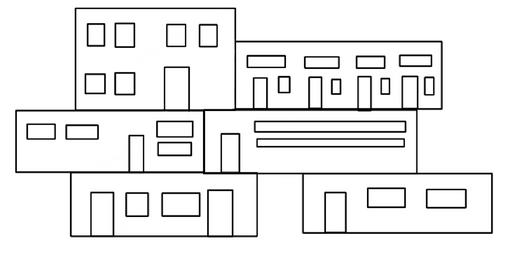MODULAR DESIGN -

ARCHITECTURAL CHARACTERISTICS, CONSTRAINTS, AND OPPORTUNITIES
STUDIOIVHONORSCONTRACT-SPRING2024 PAIGESMITH


STUDIOIVHONORSCONTRACT-SPRING2024 PAIGESMITH
OFFSITE MANUFACTURING
p. 5 - 17 p. 18 - 29 p. 30 - 41

what is modular?
building components are fabricated off-site so they can be quickly assembled on-site.

is modular?
designing on a grid. organizing architectural elements (modules) within a grid system, facilitating consistency, scalability, and ease of adaptation while maintaining aesthetic integrity.

what is modular?
aligning architectural elements along a defined axis, optimizing assembly and coordination of modular panels.

optimizing module sizes, shapes, and connections to facilitate transportation within specified constraints, ensuring efficient logistics

proactive design with optimized module integration to provide the most efficient and feasible transportation.

optimizing module sizes, shapes, and connections to facilitate transportation within specified constraints, ensuring efficient logistics

ensures quaility control through assembly-line like production with inspections and skilled labor specializations.

modular manufacturing is known for its waste reduction capability using precise cuts, recycled materials, and optimized material usage.

offsite manufacturing allows the transportation to reduced, waste to be reduced, and all GHG emissions to reduced, thus usually resulting in lower embodied carbon emissions

offsite construction allows the assembly of a structure on a difficult site to be made possible

modular manufacturing facilities have the opportunity to implement modern technological solutions to improve the production quaility , time, and sustainability, ultimately resulting in a cost-effective solution.

modules can be utilized in emergency aid to provide shelter, healthcare clinics, temporary schools, and emergency aid housing.

modular construction can produce housing in an efficient and costeffective manner through optimized production and cost.

off-site construction can be effectively applied to the realm of educational building through selective implementation.

modular construction can be used in the hospitality industry to product cost-effective and quality modules for hotel “units” or rooms.

modular construction provides an assortment of architectural benefits including quality control, costeffectiveness, sustainability, and the use of automated and innovative technology. this construction methodology has the potential to be applied widespread.